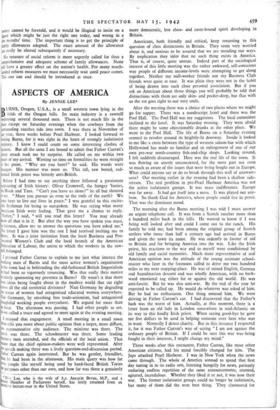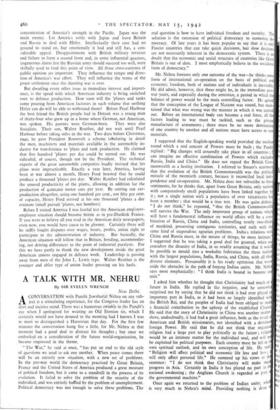ASPECTS OF AMERICA
By JENNIE LEE*
URNS, Oregon, U.S.A., is a small western town lying in the
folds of the Oregon hills. Its main industry is a sawmill employing several thousand men. There is not much life in the place except on Saturday evenings when the cowboys from the surrounding ranches ride into town. I was there in November of last year, three weeks before Pearl Harbour. I looked forward to Silting Burns, for it was right in the heart of strongly isolationist
'tory. I knew I could count on some interesting clashes of Onion. But all the same I am bound to admit that Father Curran's direct attack took me by surprise. He called on me within two hours of my arrival. Wasting no time on formalities he went straight a the point. " Why• are you here?" he said. His words were brusque. His manner was more so. This tall, raw boned, red- headed Irish priest was bitterly anti-British.
Before I had time to say anything there followed a passionate Touring of Irish history: Oliver Cromwell, the hungry 'forties, the Black and Tans. " Can't you leave us alone?" he all but shouted me. " Must you pursue us even to the ends of the earth? We nine here to live our lives in peace." I was grateful to this excite- hie Irishman for being so outspoken. He was saying what many American Irish were feeling. That gave me a chance to reply. 'Father," I said, " will you read this letter? You may already w all that is in it. But after the way you have spoken you must, fairness, allow me to answer the questions you have asked me." The letter I gave him was the, one I had received inviting me to Bums. It was a joint invitation from the local Business and Pro- fessional Women's Club and the local branch of the American ederation of Labour, the union to which the workers in the saw- mill belonged.
I pressed Father Curran to explain to me just what interest the rocking men of Burns and the most active women's organisation it the town had in befriending the old-fashioned British Imperialism he had been so vigorously trouncing. Was that really their motive jointly sponsoring my presence in Burns? Or wasn't it that there were ideas being fought about in the modern world that cut right amass all the old territorial divisions? Nazi Germany by degrading the status of women had antagonised educated women everywhere. Nazi Germany, by smashing free trade-unionism, had antagonised thoughtful working people everywhere. We argued for more than la hour. The afternoon was passing. I had other people to see. be we called a truce and agreed to meet again at the evening meeting.
I enjoyed that engagement. A small meeting in a small town ken tells you more about public opinion than a larger, more diffuse, ku representative city audience. The minister was there. The Priest was there. The schoolmaster was there. Some leading business men attended, and the officials of the local union. That aunt that the chief opinion-makers were well represented. After the speech making there was a lively question-and-discussion period. Father Curran again intervened. But he was lender, friendlier, he had been in the afternoon. His main query was how far people like myself being used by hard-faced British Tories purposes other than our own, and how far was there a genuinely 'Miss Lee, who is the wife of ?s r. Aneurin Bevan, M.P., and a r Member of Parliament herself, has lately returned from an ice lecture-tour in the United States. more democratic, less class- and caste-bound spirit developing in Britain.
Americans, both friendly and critical, keep returning to this question of class distinctions in Britain. They seem very worried about it, and anxious to be assured that we are mending our ways. By implication they infer that no such thing exists in America. That is, of course, quite untrue. Indeed part of the sociological interest of this little meeting was the rather awkward, self-conscious way people of different income-levels were attempting to get along together. Neither my mill-worker friends nor my. Business Club friends were quite at ease. It was plain they were not in the habit of being drawn into such close personal association. But if you ask an American about those things you will probably be told that distinctions with them are only skin- and pocket-deep, but that with us the rot goes right to our very souls.
After the meeting there was a choice of two places where we might go for supper. There was a nondescript .hotel and there was the Pool Hall. The Pool Hall was my suggestion. The local committee inclined to the hotel. It was Saturday evening. They were afraid there might be some objectionable drunks at the other place. We went to the Pool Hall. The life of Burns on a Saturday evening seemed to revolve around its brightly-lit doorway. Inside it looked to me like a cross between the type of western saloon-bar with which Hollywood has made us familiar and an enlargement of one of our own pre-war north-country fish-and-chip shops. Looking around, I felt suddenly discouraged. Here was the real life of the town. It was flowing on utterly unconcerned, for the most part not even so much as aware of the issues that were being fought out in Europe. What could anyone say or do to break through this wall of unaware- ness? Our meeting earlier in the evening had been a shallow side- stream. The real problem in pre-Pearl Harbour America was not the active isolationist groups. It was mass indifference. Europe was far away. It had got itself into a mess. It was played out any- how. So thank God for America, where people could live in peace. That was the dominant mood.
The morning after the Burns meeting I was told I must answer an urgent telephone call. It was from a Scotch rancher more than a hundred miles back in the hills. He wanted to know if I was being well looked after and could I come out to the ranch. His family he told me; had been among the original group of Scotch settlers who more than half a century ago had arrived in Burns and given the town its name. He was ardently in favour of aid to Britain and for bringing America into the war. Like the Irish priest, his reactions to the war and to myself were conditioned by old family and racial memories. Much more representative of real American opinion was the attitude of the young assistant school- master who later in the forenoon called to drive me two hundred miles to my next stopping-place. He was of mixed English, German and Scandinavian descent and was wholly American, with no back- ward emotional tug either for or against the old world. He was anti-fascist. But he was also anti-war. By the end of the year he expected to be called up. He would do whatever was asked of him. But he had no enthusiasm. One thing amused him. We were driving in Father Curran's car. I had discovered that the Father's bark was the worst of him. Actually, at this moment, there is a letter from an old lady in London somewhere in mid-Atlantic on its way to this kindly Irish priest. When saying good-bye he gave me five dollars to be used in helping someone over here who was in want. Normally I detest charity. But in this instance I respected it, for it was Father Curran's way of saying " I am not against the ordinary people of Britain. If I could be sure this war was being fought in their interests, I might change my mind."
Three weeks after this encounter, Father Curran, like most other American citizens, had his mind forcibly changed for him. The Japs attacked Pearl Harbour. I was in New York when the news came through. The whole of America seemed to spend that first day tuning in to its radio sets, listening hungrily for news, patiently enduring endless repetition of the same announcements, stunned, agitated, incredulous. Whether they liked it or not, it was now their war. The former isolationist groups could no longer be isolationist, but many of them did the next best thing. They clamoured for concentration of America's strength in the Pacific. Japan was the main enemy. Let America settle with Japan and leave Britain and Russia to deal with Hitler. Intellectually their case had no ground to stand on, but emotionally it had and still has, a con- siderable appeal. Disappointment with British military reverses and failure to form a second front and, in some influential quarters, ungenerous alarm lest the Russian army should succeed too well, were skilfully used to feed this point of view. All those cross-currents of public opinion are important. They influence the tempo and direc- tion of America's war effort. They will influence the terms of the peace settlement once the shooting war is over.
But dwarfing every other issue in immediate interest and import- ance, is the speed with which American industry is being switched over to defence production. How soon will the 'planes and tanks come pouring from American factories in such volume that nothing Hitler can do will be able to withstand them? Before Pearl Harbour the best friend the British people had in Detroit was a young man of thirty-four who grew up in a home where German, not American, was spoken. His parents were German-born. They were also Socialists. Their son, Walter Reuther, did not wait until Pearl Harbour before taking sides in the war. Two days before Christmas, 1940, he gave President Roosevelt a scheme tabulating in detail the men, machinery and materials available in the automobile in- dustry for transference to 'plane and tank production. He claimed that five hundred 'planes per day could be turned out. He was ridiculed, of course, though not by the President. The technical experts of the great automobile companies loudly insisted that his plans were impracticable. Exactly a year later, America, having been at war almost a month, Henry Ford boasted that he could produce a thousand 'planes per day. Walter Reuther had calculated the unused productivity of the plants, allowing in addition for the production of 4,000,000 motor cars per year. By cutting out car- production altogether, using one hundred per cent., not fifty per cent. of capacity, Henry Ford arrived at his one thousand 'planes a day estimate (small pursuit 'planes, not bombers).
Before I visited America I was fearful lest the American employer- employee situation should become brittle as in pre-Dunkirk France. If you were to believe all you read in the American daily newspapers, even now, you would have cause to be gloomy. Certainly there will be stiffly fought disputes over wages, hours, profits, union right to participate in the administration of industry. But basically, the American situation will follow that in Britain, bending, accommodat- ing, not driving differences to the point of industrial paralysis. For this we have partly to thank the new development inside the great American unions engaged in defence work. Leadership is passing away from men of the John L. Lewis type. Walter Reuther is the younger and abler type of union leader pressing on his heels.



























 Previous page
Previous page